Detailed Report: Management and Operations at Unilever - Unit 4
VerifiedAdded on 2022/12/27
|13
|3698
|53
Report
AI Summary
This report examines the management and operations of Unilever Plc, a British multinational company. It explores the roles and characteristics of leaders and managers, differentiating their functions within the organization. The report analyzes how leaders and managers handle various business situations, such as conflict, task failure, sales decline, and change management. It then applies leadership theories and models, including situational leadership, systems leadership, and contingency theory, to the context of Unilever. Furthermore, the report delves into key approaches of operational management, such as lean manufacturing and Six Sigma, and outlines the roles of leaders and managers in these approaches. Finally, it discusses the impact of business environment factors on operational management and decision-making within the company. The report aims to provide a comprehensive understanding of leadership and management practices within a real-world business context, providing insights into how Unilever achieves its objectives and navigates challenges.
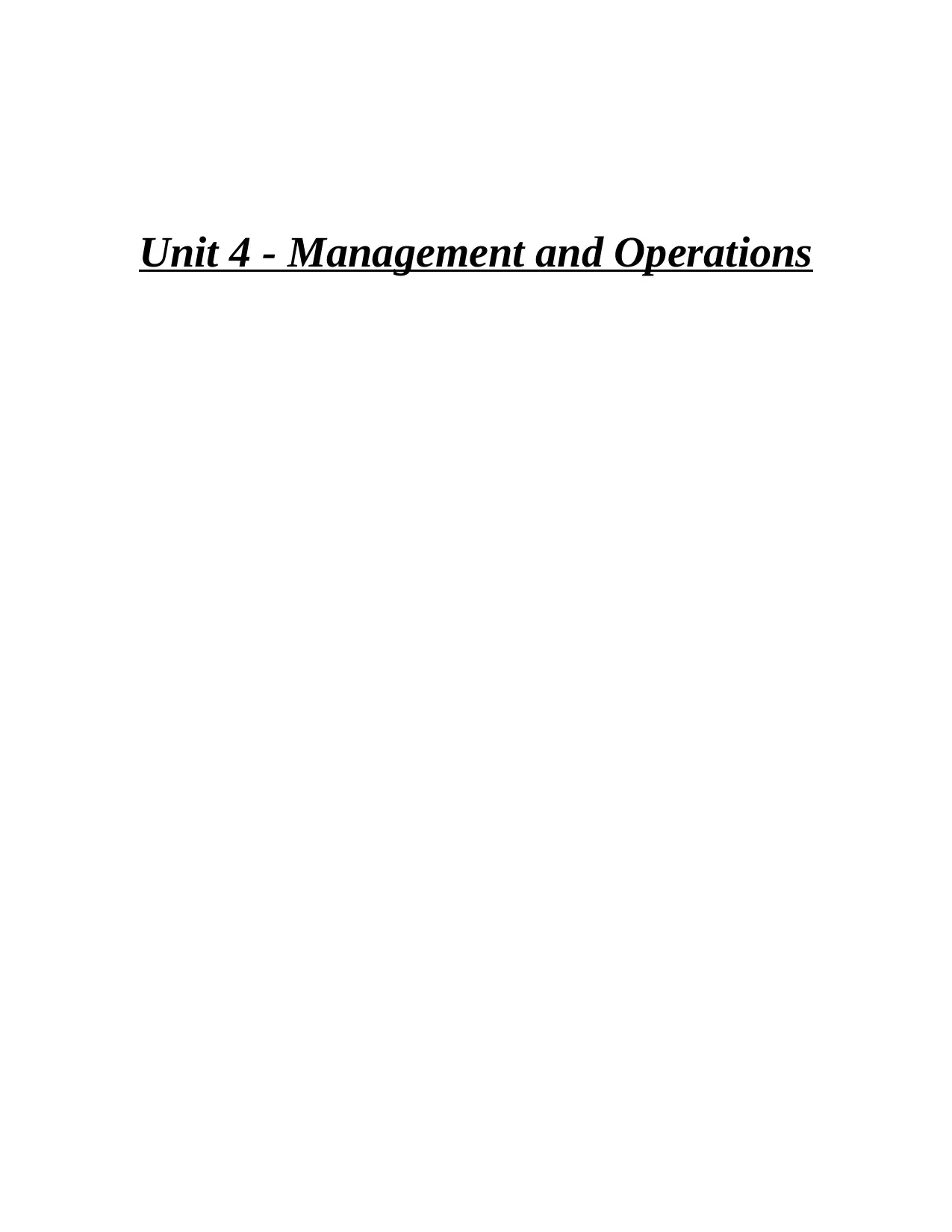
Unit 4 - Management and Operations
Paraphrase This Document
Need a fresh take? Get an instant paraphrase of this document with our AI Paraphraser
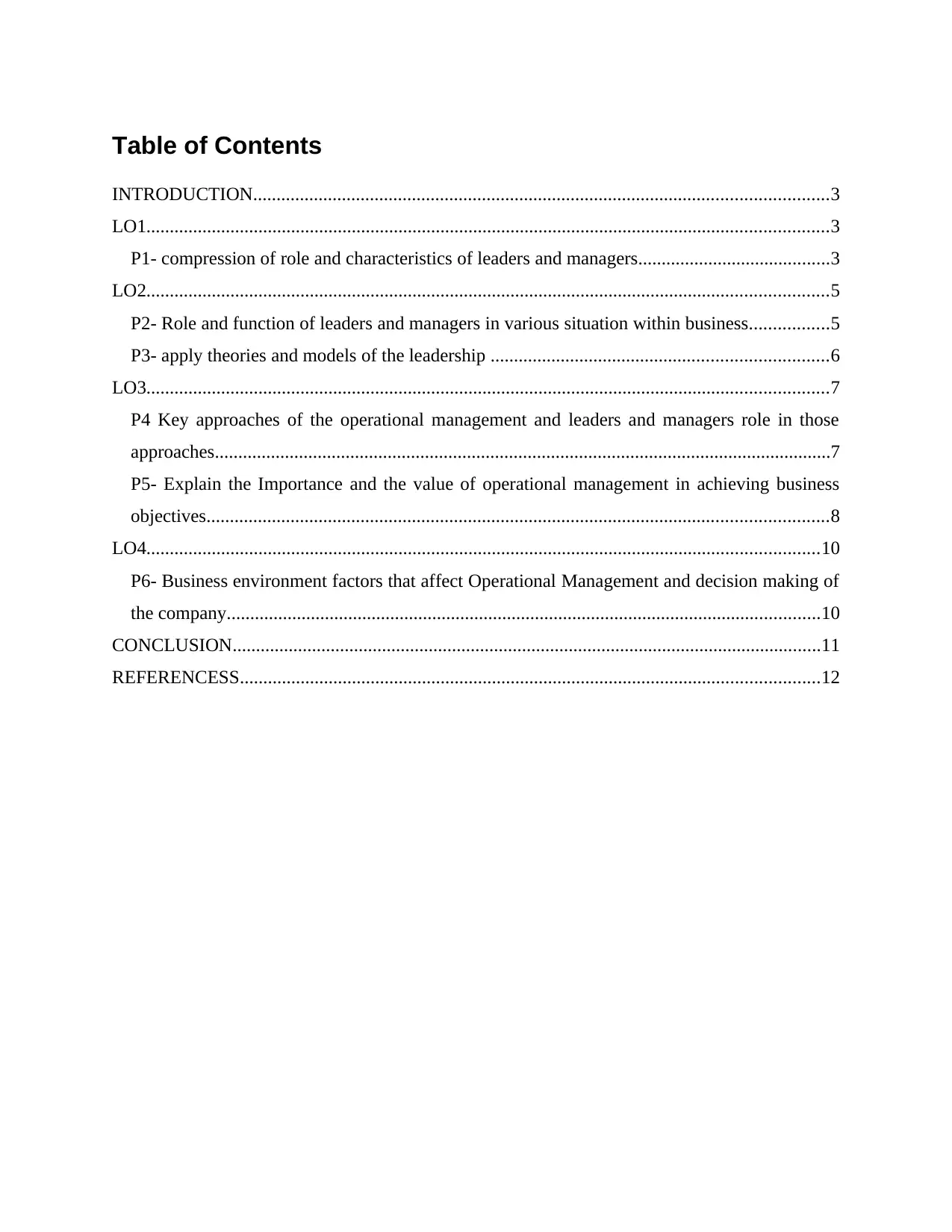
Table of Contents
INTRODUCTION...........................................................................................................................3
LO1..................................................................................................................................................3
P1- compression of role and characteristics of leaders and managers.........................................3
LO2..................................................................................................................................................5
P2- Role and function of leaders and managers in various situation within business.................5
P3- apply theories and models of the leadership ........................................................................6
LO3..................................................................................................................................................7
P4 Key approaches of the operational management and leaders and managers role in those
approaches....................................................................................................................................7
P5- Explain the Importance and the value of operational management in achieving business
objectives.....................................................................................................................................8
LO4................................................................................................................................................10
P6- Business environment factors that affect Operational Management and decision making of
the company...............................................................................................................................10
CONCLUSION..............................................................................................................................11
REFERENCESS............................................................................................................................12
INTRODUCTION...........................................................................................................................3
LO1..................................................................................................................................................3
P1- compression of role and characteristics of leaders and managers.........................................3
LO2..................................................................................................................................................5
P2- Role and function of leaders and managers in various situation within business.................5
P3- apply theories and models of the leadership ........................................................................6
LO3..................................................................................................................................................7
P4 Key approaches of the operational management and leaders and managers role in those
approaches....................................................................................................................................7
P5- Explain the Importance and the value of operational management in achieving business
objectives.....................................................................................................................................8
LO4................................................................................................................................................10
P6- Business environment factors that affect Operational Management and decision making of
the company...............................................................................................................................10
CONCLUSION..............................................................................................................................11
REFERENCESS............................................................................................................................12
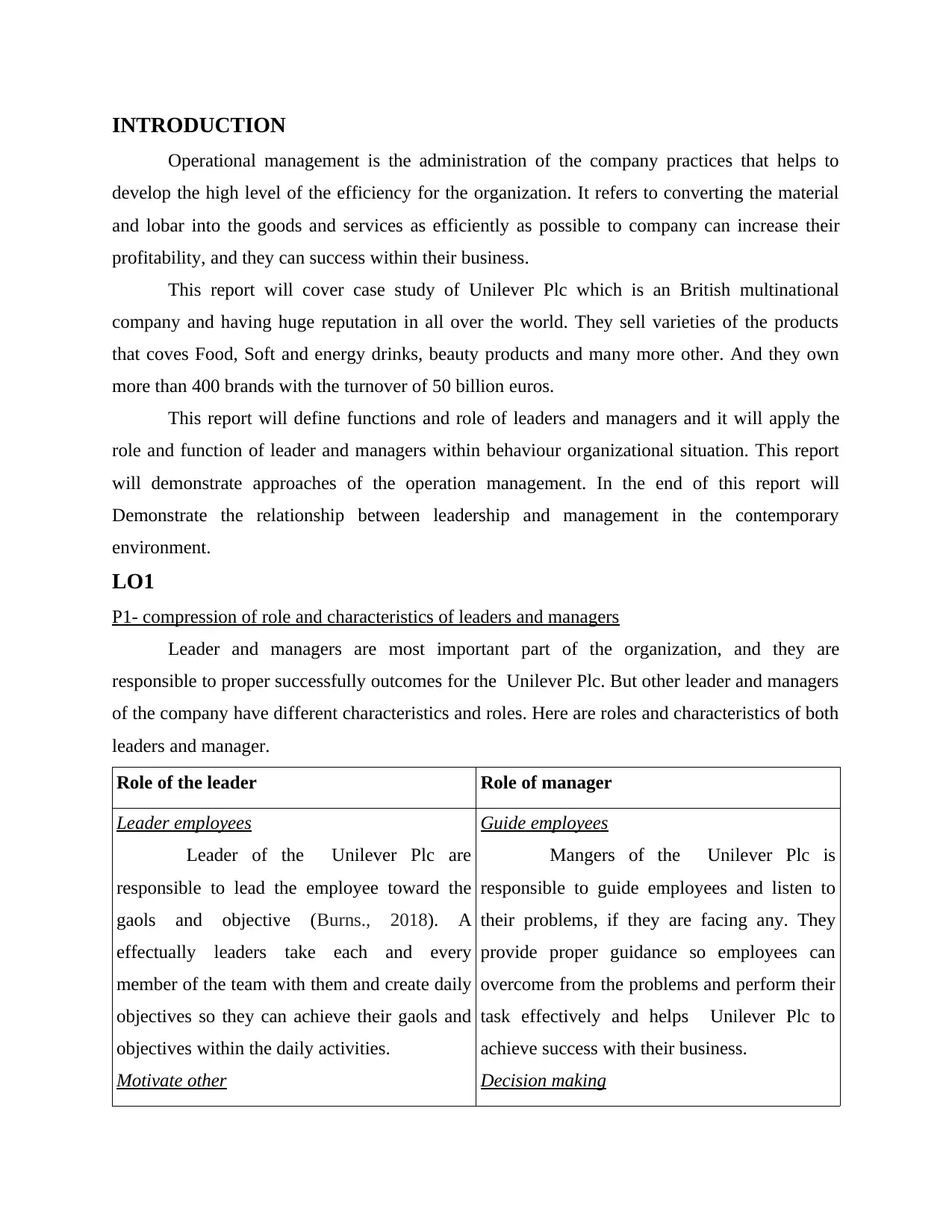
INTRODUCTION
Operational management is the administration of the company practices that helps to
develop the high level of the efficiency for the organization. It refers to converting the material
and lobar into the goods and services as efficiently as possible to company can increase their
profitability, and they can success within their business.
This report will cover case study of Unilever Plc which is an British multinational
company and having huge reputation in all over the world. They sell varieties of the products
that coves Food, Soft and energy drinks, beauty products and many more other. And they own
more than 400 brands with the turnover of 50 billion euros.
This report will define functions and role of leaders and managers and it will apply the
role and function of leader and managers within behaviour organizational situation. This report
will demonstrate approaches of the operation management. In the end of this report will
Demonstrate the relationship between leadership and management in the contemporary
environment.
LO1
P1- compression of role and characteristics of leaders and managers
Leader and managers are most important part of the organization, and they are
responsible to proper successfully outcomes for the Unilever Plc. But other leader and managers
of the company have different characteristics and roles. Here are roles and characteristics of both
leaders and manager.
Role of the leader Role of manager
Leader employees
Leader of the Unilever Plc are
responsible to lead the employee toward the
gaols and objective (Burns., 2018). A
effectually leaders take each and every
member of the team with them and create daily
objectives so they can achieve their gaols and
objectives within the daily activities.
Motivate other
Guide employees
Mangers of the Unilever Plc is
responsible to guide employees and listen to
their problems, if they are facing any. They
provide proper guidance so employees can
overcome from the problems and perform their
task effectively and helps Unilever Plc to
achieve success with their business.
Decision making
Operational management is the administration of the company practices that helps to
develop the high level of the efficiency for the organization. It refers to converting the material
and lobar into the goods and services as efficiently as possible to company can increase their
profitability, and they can success within their business.
This report will cover case study of Unilever Plc which is an British multinational
company and having huge reputation in all over the world. They sell varieties of the products
that coves Food, Soft and energy drinks, beauty products and many more other. And they own
more than 400 brands with the turnover of 50 billion euros.
This report will define functions and role of leaders and managers and it will apply the
role and function of leader and managers within behaviour organizational situation. This report
will demonstrate approaches of the operation management. In the end of this report will
Demonstrate the relationship between leadership and management in the contemporary
environment.
LO1
P1- compression of role and characteristics of leaders and managers
Leader and managers are most important part of the organization, and they are
responsible to proper successfully outcomes for the Unilever Plc. But other leader and managers
of the company have different characteristics and roles. Here are roles and characteristics of both
leaders and manager.
Role of the leader Role of manager
Leader employees
Leader of the Unilever Plc are
responsible to lead the employee toward the
gaols and objective (Burns., 2018). A
effectually leaders take each and every
member of the team with them and create daily
objectives so they can achieve their gaols and
objectives within the daily activities.
Motivate other
Guide employees
Mangers of the Unilever Plc is
responsible to guide employees and listen to
their problems, if they are facing any. They
provide proper guidance so employees can
overcome from the problems and perform their
task effectively and helps Unilever Plc to
achieve success with their business.
Decision making
⊘ This is a preview!⊘
Do you want full access?
Subscribe today to unlock all pages.

Trusted by 1+ million students worldwide
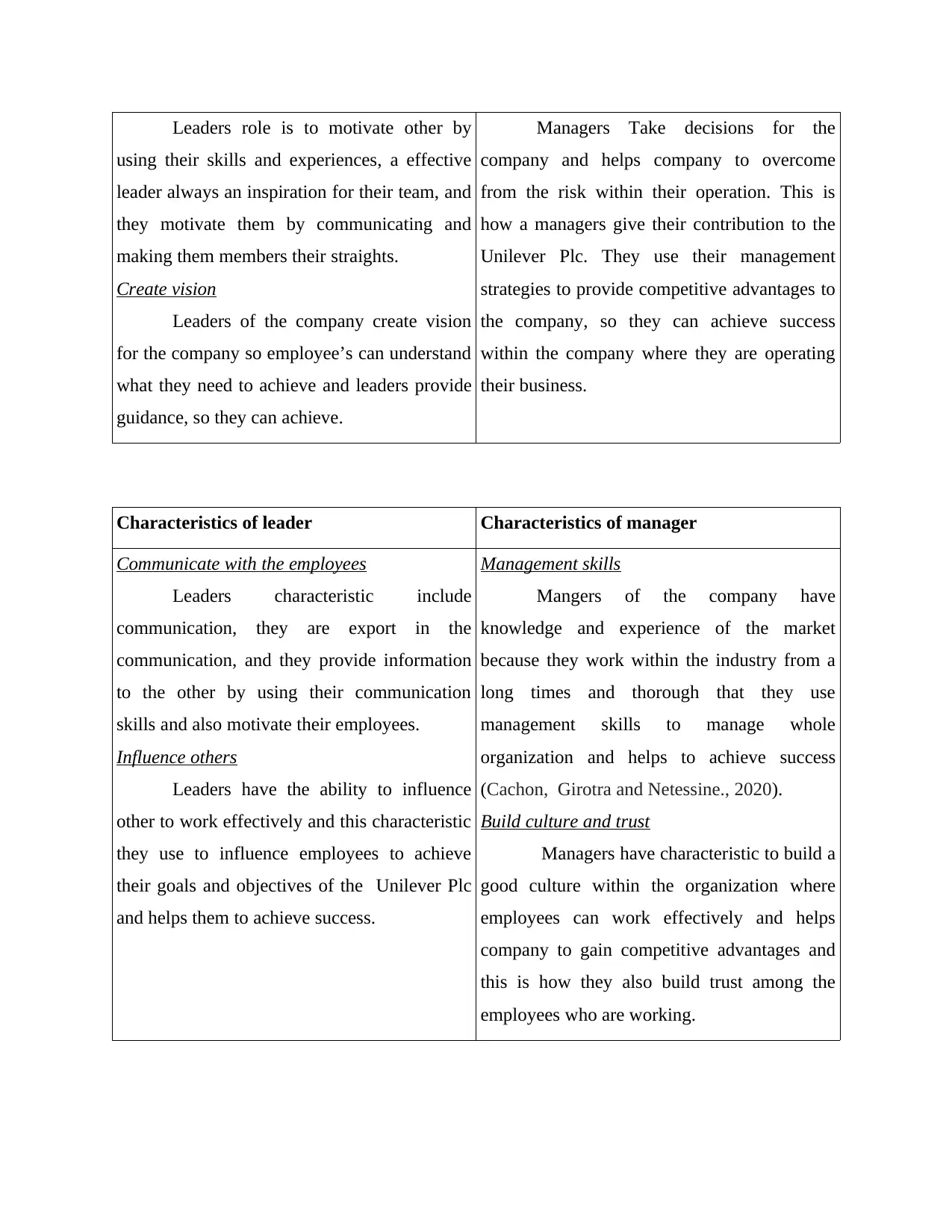
Leaders role is to motivate other by
using their skills and experiences, a effective
leader always an inspiration for their team, and
they motivate them by communicating and
making them members their straights.
Create vision
Leaders of the company create vision
for the company so employee’s can understand
what they need to achieve and leaders provide
guidance, so they can achieve.
Managers Take decisions for the
company and helps company to overcome
from the risk within their operation. This is
how a managers give their contribution to the
Unilever Plc. They use their management
strategies to provide competitive advantages to
the company, so they can achieve success
within the company where they are operating
their business.
Characteristics of leader Characteristics of manager
Communicate with the employees
Leaders characteristic include
communication, they are export in the
communication, and they provide information
to the other by using their communication
skills and also motivate their employees.
Influence others
Leaders have the ability to influence
other to work effectively and this characteristic
they use to influence employees to achieve
their goals and objectives of the Unilever Plc
and helps them to achieve success.
Management skills
Mangers of the company have
knowledge and experience of the market
because they work within the industry from a
long times and thorough that they use
management skills to manage whole
organization and helps to achieve success
(Cachon, Girotra and Netessine., 2020).
Build culture and trust
Managers have characteristic to build a
good culture within the organization where
employees can work effectively and helps
company to gain competitive advantages and
this is how they also build trust among the
employees who are working.
using their skills and experiences, a effective
leader always an inspiration for their team, and
they motivate them by communicating and
making them members their straights.
Create vision
Leaders of the company create vision
for the company so employee’s can understand
what they need to achieve and leaders provide
guidance, so they can achieve.
Managers Take decisions for the
company and helps company to overcome
from the risk within their operation. This is
how a managers give their contribution to the
Unilever Plc. They use their management
strategies to provide competitive advantages to
the company, so they can achieve success
within the company where they are operating
their business.
Characteristics of leader Characteristics of manager
Communicate with the employees
Leaders characteristic include
communication, they are export in the
communication, and they provide information
to the other by using their communication
skills and also motivate their employees.
Influence others
Leaders have the ability to influence
other to work effectively and this characteristic
they use to influence employees to achieve
their goals and objectives of the Unilever Plc
and helps them to achieve success.
Management skills
Mangers of the company have
knowledge and experience of the market
because they work within the industry from a
long times and thorough that they use
management skills to manage whole
organization and helps to achieve success
(Cachon, Girotra and Netessine., 2020).
Build culture and trust
Managers have characteristic to build a
good culture within the organization where
employees can work effectively and helps
company to gain competitive advantages and
this is how they also build trust among the
employees who are working.
Paraphrase This Document
Need a fresh take? Get an instant paraphrase of this document with our AI Paraphraser
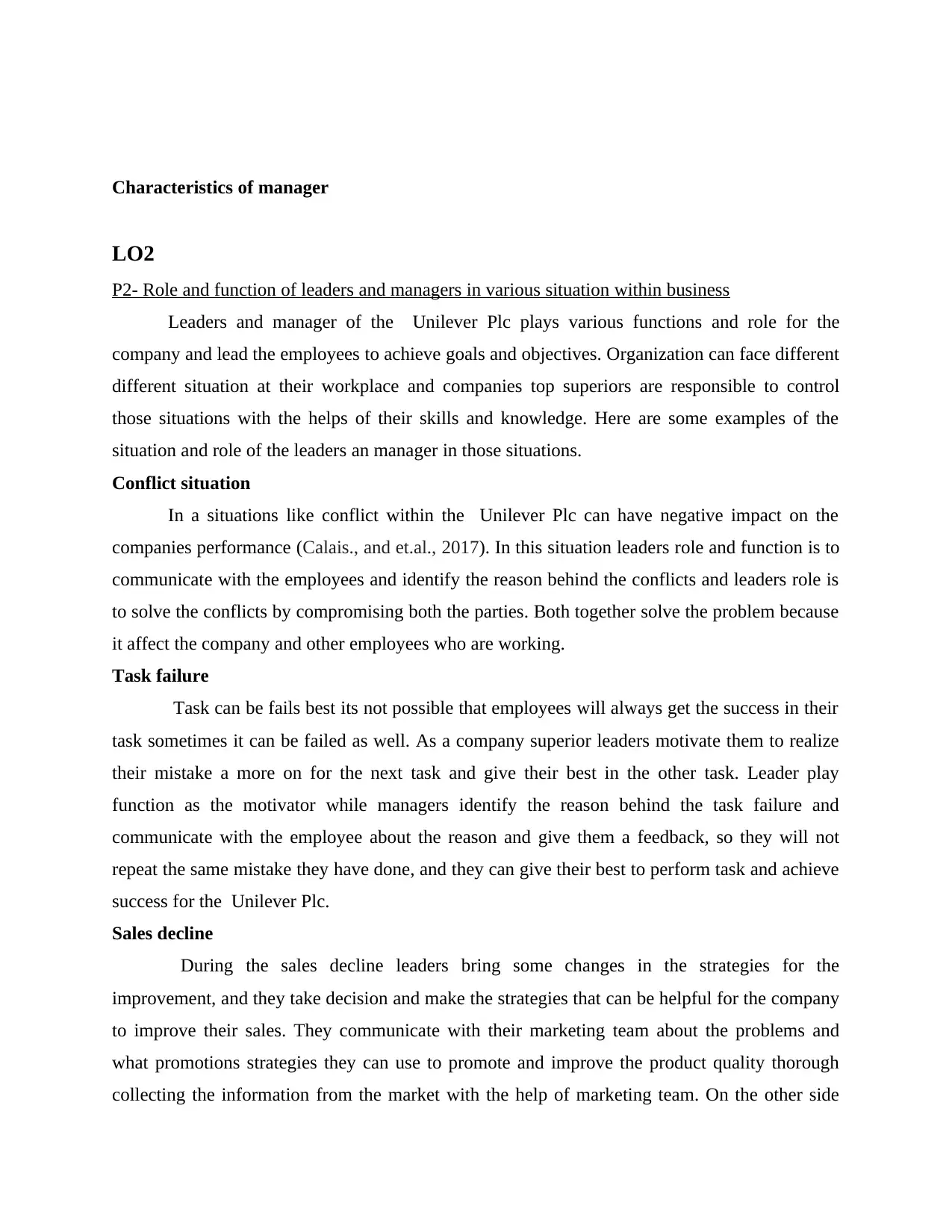
Characteristics of manager
LO2
P2- Role and function of leaders and managers in various situation within business
Leaders and manager of the Unilever Plc plays various functions and role for the
company and lead the employees to achieve goals and objectives. Organization can face different
different situation at their workplace and companies top superiors are responsible to control
those situations with the helps of their skills and knowledge. Here are some examples of the
situation and role of the leaders an manager in those situations.
Conflict situation
In a situations like conflict within the Unilever Plc can have negative impact on the
companies performance (Calais., and et.al., 2017). In this situation leaders role and function is to
communicate with the employees and identify the reason behind the conflicts and leaders role is
to solve the conflicts by compromising both the parties. Both together solve the problem because
it affect the company and other employees who are working.
Task failure
Task can be fails best its not possible that employees will always get the success in their
task sometimes it can be failed as well. As a company superior leaders motivate them to realize
their mistake a more on for the next task and give their best in the other task. Leader play
function as the motivator while managers identify the reason behind the task failure and
communicate with the employee about the reason and give them a feedback, so they will not
repeat the same mistake they have done, and they can give their best to perform task and achieve
success for the Unilever Plc.
Sales decline
During the sales decline leaders bring some changes in the strategies for the
improvement, and they take decision and make the strategies that can be helpful for the company
to improve their sales. They communicate with their marketing team about the problems and
what promotions strategies they can use to promote and improve the product quality thorough
collecting the information from the market with the help of marketing team. On the other side
LO2
P2- Role and function of leaders and managers in various situation within business
Leaders and manager of the Unilever Plc plays various functions and role for the
company and lead the employees to achieve goals and objectives. Organization can face different
different situation at their workplace and companies top superiors are responsible to control
those situations with the helps of their skills and knowledge. Here are some examples of the
situation and role of the leaders an manager in those situations.
Conflict situation
In a situations like conflict within the Unilever Plc can have negative impact on the
companies performance (Calais., and et.al., 2017). In this situation leaders role and function is to
communicate with the employees and identify the reason behind the conflicts and leaders role is
to solve the conflicts by compromising both the parties. Both together solve the problem because
it affect the company and other employees who are working.
Task failure
Task can be fails best its not possible that employees will always get the success in their
task sometimes it can be failed as well. As a company superior leaders motivate them to realize
their mistake a more on for the next task and give their best in the other task. Leader play
function as the motivator while managers identify the reason behind the task failure and
communicate with the employee about the reason and give them a feedback, so they will not
repeat the same mistake they have done, and they can give their best to perform task and achieve
success for the Unilever Plc.
Sales decline
During the sales decline leaders bring some changes in the strategies for the
improvement, and they take decision and make the strategies that can be helpful for the company
to improve their sales. They communicate with their marketing team about the problems and
what promotions strategies they can use to promote and improve the product quality thorough
collecting the information from the market with the help of marketing team. On the other side
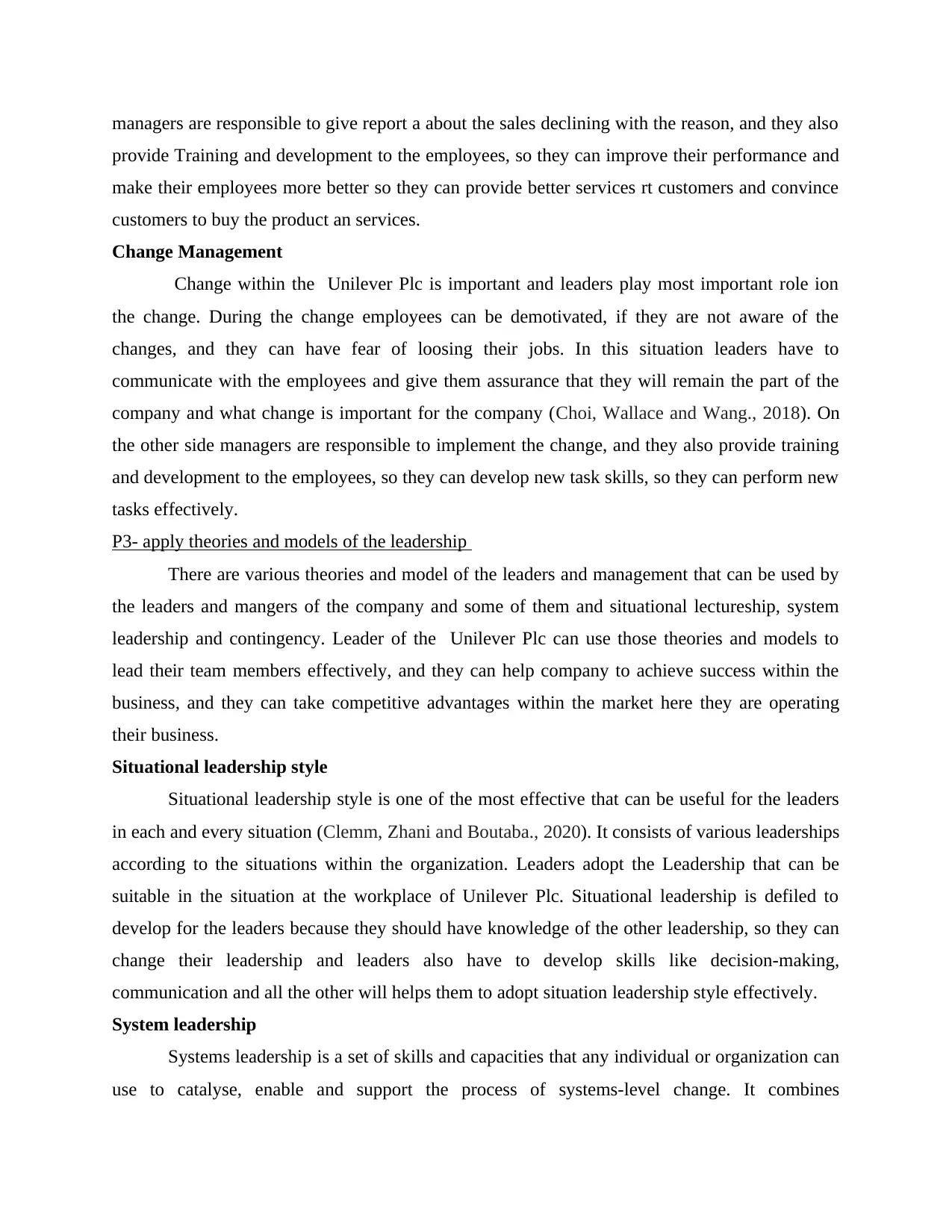
managers are responsible to give report a about the sales declining with the reason, and they also
provide Training and development to the employees, so they can improve their performance and
make their employees more better so they can provide better services rt customers and convince
customers to buy the product an services.
Change Management
Change within the Unilever Plc is important and leaders play most important role ion
the change. During the change employees can be demotivated, if they are not aware of the
changes, and they can have fear of loosing their jobs. In this situation leaders have to
communicate with the employees and give them assurance that they will remain the part of the
company and what change is important for the company (Choi, Wallace and Wang., 2018). On
the other side managers are responsible to implement the change, and they also provide training
and development to the employees, so they can develop new task skills, so they can perform new
tasks effectively.
P3- apply theories and models of the leadership
There are various theories and model of the leaders and management that can be used by
the leaders and mangers of the company and some of them and situational lectureship, system
leadership and contingency. Leader of the Unilever Plc can use those theories and models to
lead their team members effectively, and they can help company to achieve success within the
business, and they can take competitive advantages within the market here they are operating
their business.
Situational leadership style
Situational leadership style is one of the most effective that can be useful for the leaders
in each and every situation (Clemm, Zhani and Boutaba., 2020). It consists of various leaderships
according to the situations within the organization. Leaders adopt the Leadership that can be
suitable in the situation at the workplace of Unilever Plc. Situational leadership is defiled to
develop for the leaders because they should have knowledge of the other leadership, so they can
change their leadership and leaders also have to develop skills like decision-making,
communication and all the other will helps them to adopt situation leadership style effectively.
System leadership
Systems leadership is a set of skills and capacities that any individual or organization can
use to catalyse, enable and support the process of systems-level change. It combines
provide Training and development to the employees, so they can improve their performance and
make their employees more better so they can provide better services rt customers and convince
customers to buy the product an services.
Change Management
Change within the Unilever Plc is important and leaders play most important role ion
the change. During the change employees can be demotivated, if they are not aware of the
changes, and they can have fear of loosing their jobs. In this situation leaders have to
communicate with the employees and give them assurance that they will remain the part of the
company and what change is important for the company (Choi, Wallace and Wang., 2018). On
the other side managers are responsible to implement the change, and they also provide training
and development to the employees, so they can develop new task skills, so they can perform new
tasks effectively.
P3- apply theories and models of the leadership
There are various theories and model of the leaders and management that can be used by
the leaders and mangers of the company and some of them and situational lectureship, system
leadership and contingency. Leader of the Unilever Plc can use those theories and models to
lead their team members effectively, and they can help company to achieve success within the
business, and they can take competitive advantages within the market here they are operating
their business.
Situational leadership style
Situational leadership style is one of the most effective that can be useful for the leaders
in each and every situation (Clemm, Zhani and Boutaba., 2020). It consists of various leaderships
according to the situations within the organization. Leaders adopt the Leadership that can be
suitable in the situation at the workplace of Unilever Plc. Situational leadership is defiled to
develop for the leaders because they should have knowledge of the other leadership, so they can
change their leadership and leaders also have to develop skills like decision-making,
communication and all the other will helps them to adopt situation leadership style effectively.
System leadership
Systems leadership is a set of skills and capacities that any individual or organization can
use to catalyse, enable and support the process of systems-level change. It combines
⊘ This is a preview!⊘
Do you want full access?
Subscribe today to unlock all pages.

Trusted by 1+ million students worldwide
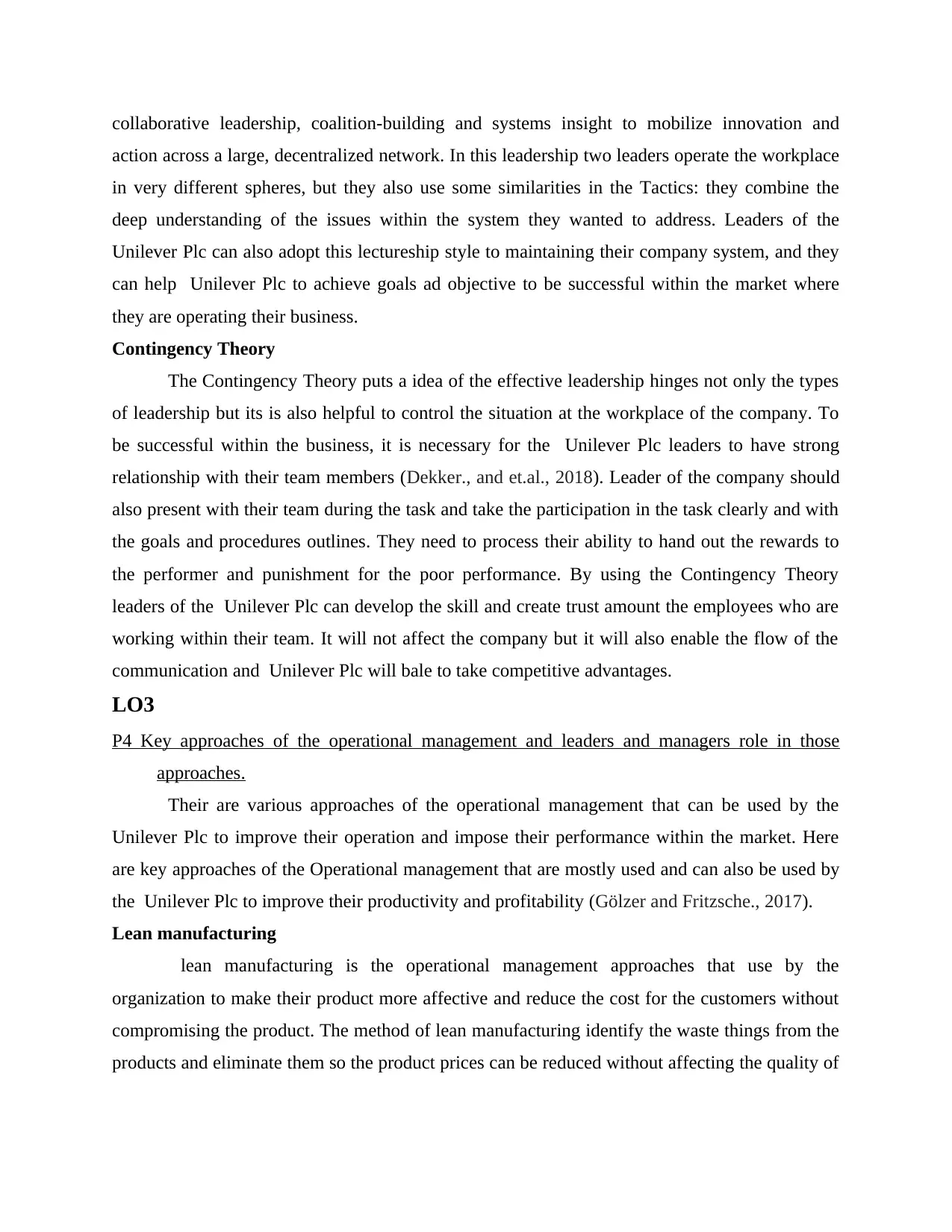
collaborative leadership, coalition-building and systems insight to mobilize innovation and
action across a large, decentralized network. In this leadership two leaders operate the workplace
in very different spheres, but they also use some similarities in the Tactics: they combine the
deep understanding of the issues within the system they wanted to address. Leaders of the
Unilever Plc can also adopt this lectureship style to maintaining their company system, and they
can help Unilever Plc to achieve goals ad objective to be successful within the market where
they are operating their business.
Contingency Theory
The Contingency Theory puts a idea of the effective leadership hinges not only the types
of leadership but its is also helpful to control the situation at the workplace of the company. To
be successful within the business, it is necessary for the Unilever Plc leaders to have strong
relationship with their team members (Dekker., and et.al., 2018). Leader of the company should
also present with their team during the task and take the participation in the task clearly and with
the goals and procedures outlines. They need to process their ability to hand out the rewards to
the performer and punishment for the poor performance. By using the Contingency Theory
leaders of the Unilever Plc can develop the skill and create trust amount the employees who are
working within their team. It will not affect the company but it will also enable the flow of the
communication and Unilever Plc will bale to take competitive advantages.
LO3
P4 Key approaches of the operational management and leaders and managers role in those
approaches.
Their are various approaches of the operational management that can be used by the
Unilever Plc to improve their operation and impose their performance within the market. Here
are key approaches of the Operational management that are mostly used and can also be used by
the Unilever Plc to improve their productivity and profitability (Gölzer and Fritzsche., 2017).
Lean manufacturing
lean manufacturing is the operational management approaches that use by the
organization to make their product more affective and reduce the cost for the customers without
compromising the product. The method of lean manufacturing identify the waste things from the
products and eliminate them so the product prices can be reduced without affecting the quality of
action across a large, decentralized network. In this leadership two leaders operate the workplace
in very different spheres, but they also use some similarities in the Tactics: they combine the
deep understanding of the issues within the system they wanted to address. Leaders of the
Unilever Plc can also adopt this lectureship style to maintaining their company system, and they
can help Unilever Plc to achieve goals ad objective to be successful within the market where
they are operating their business.
Contingency Theory
The Contingency Theory puts a idea of the effective leadership hinges not only the types
of leadership but its is also helpful to control the situation at the workplace of the company. To
be successful within the business, it is necessary for the Unilever Plc leaders to have strong
relationship with their team members (Dekker., and et.al., 2018). Leader of the company should
also present with their team during the task and take the participation in the task clearly and with
the goals and procedures outlines. They need to process their ability to hand out the rewards to
the performer and punishment for the poor performance. By using the Contingency Theory
leaders of the Unilever Plc can develop the skill and create trust amount the employees who are
working within their team. It will not affect the company but it will also enable the flow of the
communication and Unilever Plc will bale to take competitive advantages.
LO3
P4 Key approaches of the operational management and leaders and managers role in those
approaches.
Their are various approaches of the operational management that can be used by the
Unilever Plc to improve their operation and impose their performance within the market. Here
are key approaches of the Operational management that are mostly used and can also be used by
the Unilever Plc to improve their productivity and profitability (Gölzer and Fritzsche., 2017).
Lean manufacturing
lean manufacturing is the operational management approaches that use by the
organization to make their product more affective and reduce the cost for the customers without
compromising the product. The method of lean manufacturing identify the waste things from the
products and eliminate them so the product prices can be reduced without affecting the quality of
Paraphrase This Document
Need a fresh take? Get an instant paraphrase of this document with our AI Paraphraser
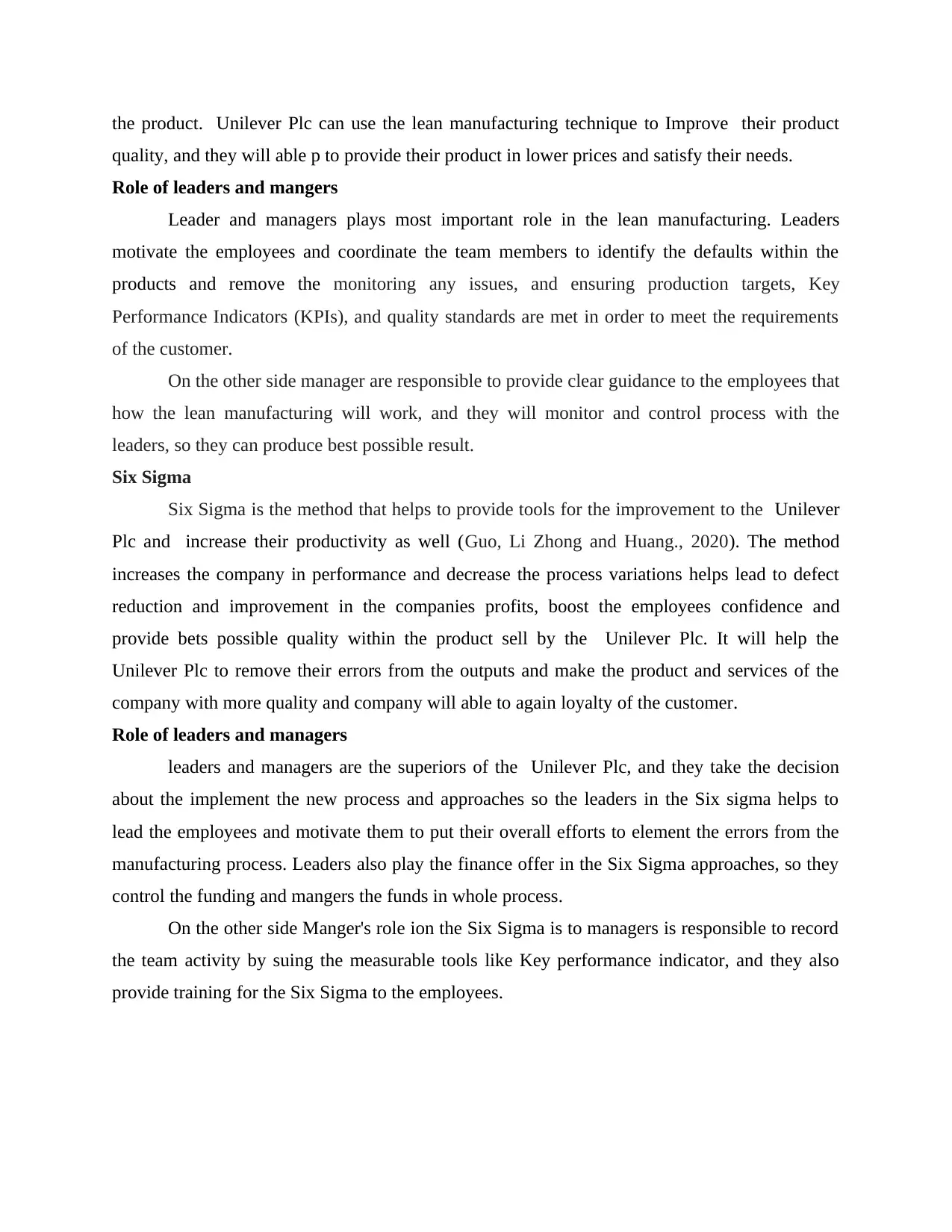
the product. Unilever Plc can use the lean manufacturing technique to Improve their product
quality, and they will able p to provide their product in lower prices and satisfy their needs.
Role of leaders and mangers
Leader and managers plays most important role in the lean manufacturing. Leaders
motivate the employees and coordinate the team members to identify the defaults within the
products and remove the monitoring any issues, and ensuring production targets, Key
Performance Indicators (KPIs), and quality standards are met in order to meet the requirements
of the customer.
On the other side manager are responsible to provide clear guidance to the employees that
how the lean manufacturing will work, and they will monitor and control process with the
leaders, so they can produce best possible result.
Six Sigma
Six Sigma is the method that helps to provide tools for the improvement to the Unilever
Plc and increase their productivity as well (Guo, Li Zhong and Huang., 2020). The method
increases the company in performance and decrease the process variations helps lead to defect
reduction and improvement in the companies profits, boost the employees confidence and
provide bets possible quality within the product sell by the Unilever Plc. It will help the
Unilever Plc to remove their errors from the outputs and make the product and services of the
company with more quality and company will able to again loyalty of the customer.
Role of leaders and managers
leaders and managers are the superiors of the Unilever Plc, and they take the decision
about the implement the new process and approaches so the leaders in the Six sigma helps to
lead the employees and motivate them to put their overall efforts to element the errors from the
manufacturing process. Leaders also play the finance offer in the Six Sigma approaches, so they
control the funding and mangers the funds in whole process.
On the other side Manger's role ion the Six Sigma is to managers is responsible to record
the team activity by suing the measurable tools like Key performance indicator, and they also
provide training for the Six Sigma to the employees.
quality, and they will able p to provide their product in lower prices and satisfy their needs.
Role of leaders and mangers
Leader and managers plays most important role in the lean manufacturing. Leaders
motivate the employees and coordinate the team members to identify the defaults within the
products and remove the monitoring any issues, and ensuring production targets, Key
Performance Indicators (KPIs), and quality standards are met in order to meet the requirements
of the customer.
On the other side manager are responsible to provide clear guidance to the employees that
how the lean manufacturing will work, and they will monitor and control process with the
leaders, so they can produce best possible result.
Six Sigma
Six Sigma is the method that helps to provide tools for the improvement to the Unilever
Plc and increase their productivity as well (Guo, Li Zhong and Huang., 2020). The method
increases the company in performance and decrease the process variations helps lead to defect
reduction and improvement in the companies profits, boost the employees confidence and
provide bets possible quality within the product sell by the Unilever Plc. It will help the
Unilever Plc to remove their errors from the outputs and make the product and services of the
company with more quality and company will able to again loyalty of the customer.
Role of leaders and managers
leaders and managers are the superiors of the Unilever Plc, and they take the decision
about the implement the new process and approaches so the leaders in the Six sigma helps to
lead the employees and motivate them to put their overall efforts to element the errors from the
manufacturing process. Leaders also play the finance offer in the Six Sigma approaches, so they
control the funding and mangers the funds in whole process.
On the other side Manger's role ion the Six Sigma is to managers is responsible to record
the team activity by suing the measurable tools like Key performance indicator, and they also
provide training for the Six Sigma to the employees.
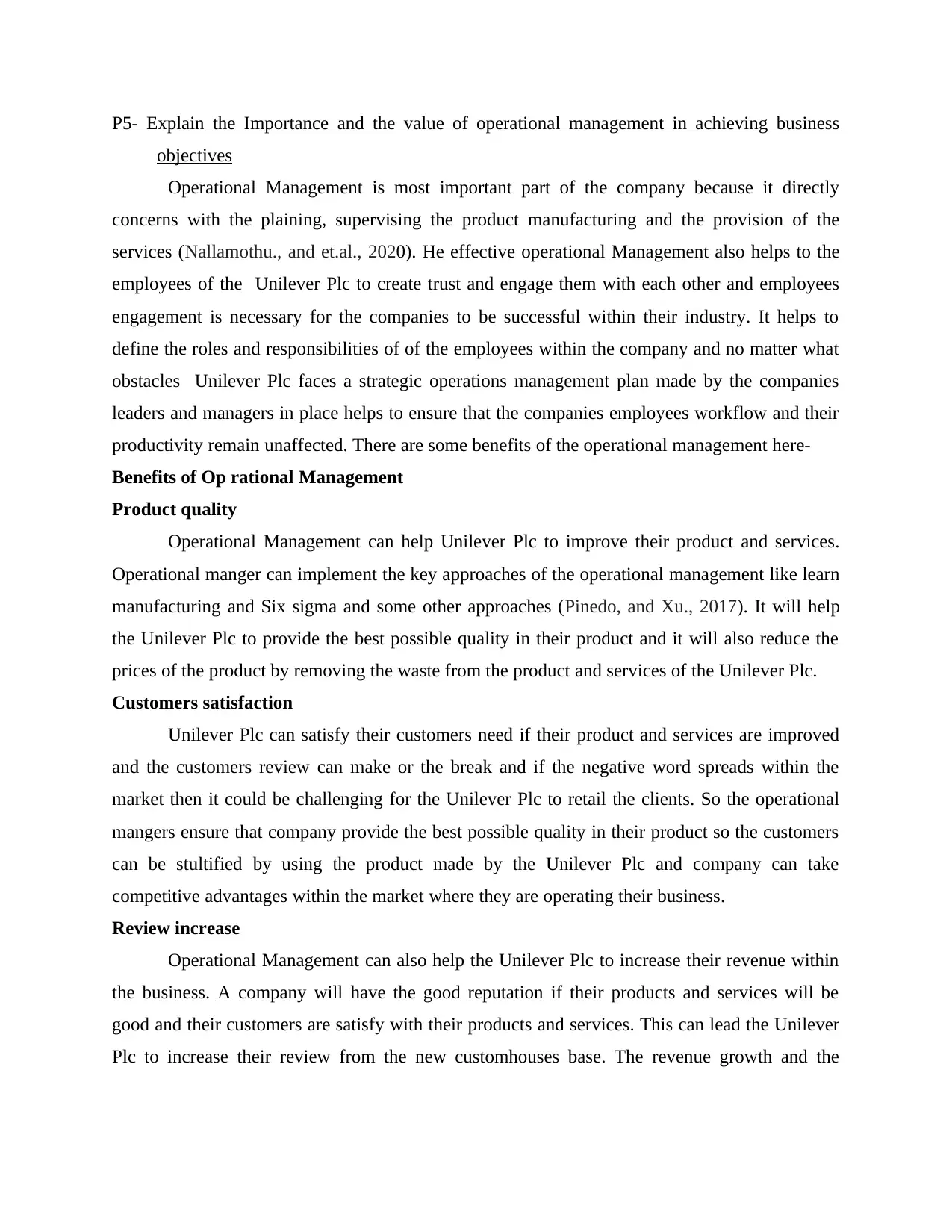
P5- Explain the Importance and the value of operational management in achieving business
objectives
Operational Management is most important part of the company because it directly
concerns with the plaining, supervising the product manufacturing and the provision of the
services (Nallamothu., and et.al., 2020). He effective operational Management also helps to the
employees of the Unilever Plc to create trust and engage them with each other and employees
engagement is necessary for the companies to be successful within their industry. It helps to
define the roles and responsibilities of of the employees within the company and no matter what
obstacles Unilever Plc faces a strategic operations management plan made by the companies
leaders and managers in place helps to ensure that the companies employees workflow and their
productivity remain unaffected. There are some benefits of the operational management here-
Benefits of Op rational Management
Product quality
Operational Management can help Unilever Plc to improve their product and services.
Operational manger can implement the key approaches of the operational management like learn
manufacturing and Six sigma and some other approaches (Pinedo, and Xu., 2017). It will help
the Unilever Plc to provide the best possible quality in their product and it will also reduce the
prices of the product by removing the waste from the product and services of the Unilever Plc.
Customers satisfaction
Unilever Plc can satisfy their customers need if their product and services are improved
and the customers review can make or the break and if the negative word spreads within the
market then it could be challenging for the Unilever Plc to retail the clients. So the operational
mangers ensure that company provide the best possible quality in their product so the customers
can be stultified by using the product made by the Unilever Plc and company can take
competitive advantages within the market where they are operating their business.
Review increase
Operational Management can also help the Unilever Plc to increase their revenue within
the business. A company will have the good reputation if their products and services will be
good and their customers are satisfy with their products and services. This can lead the Unilever
Plc to increase their review from the new customhouses base. The revenue growth and the
objectives
Operational Management is most important part of the company because it directly
concerns with the plaining, supervising the product manufacturing and the provision of the
services (Nallamothu., and et.al., 2020). He effective operational Management also helps to the
employees of the Unilever Plc to create trust and engage them with each other and employees
engagement is necessary for the companies to be successful within their industry. It helps to
define the roles and responsibilities of of the employees within the company and no matter what
obstacles Unilever Plc faces a strategic operations management plan made by the companies
leaders and managers in place helps to ensure that the companies employees workflow and their
productivity remain unaffected. There are some benefits of the operational management here-
Benefits of Op rational Management
Product quality
Operational Management can help Unilever Plc to improve their product and services.
Operational manger can implement the key approaches of the operational management like learn
manufacturing and Six sigma and some other approaches (Pinedo, and Xu., 2017). It will help
the Unilever Plc to provide the best possible quality in their product and it will also reduce the
prices of the product by removing the waste from the product and services of the Unilever Plc.
Customers satisfaction
Unilever Plc can satisfy their customers need if their product and services are improved
and the customers review can make or the break and if the negative word spreads within the
market then it could be challenging for the Unilever Plc to retail the clients. So the operational
mangers ensure that company provide the best possible quality in their product so the customers
can be stultified by using the product made by the Unilever Plc and company can take
competitive advantages within the market where they are operating their business.
Review increase
Operational Management can also help the Unilever Plc to increase their revenue within
the business. A company will have the good reputation if their products and services will be
good and their customers are satisfy with their products and services. This can lead the Unilever
Plc to increase their review from the new customhouses base. The revenue growth and the
⊘ This is a preview!⊘
Do you want full access?
Subscribe today to unlock all pages.

Trusted by 1+ million students worldwide
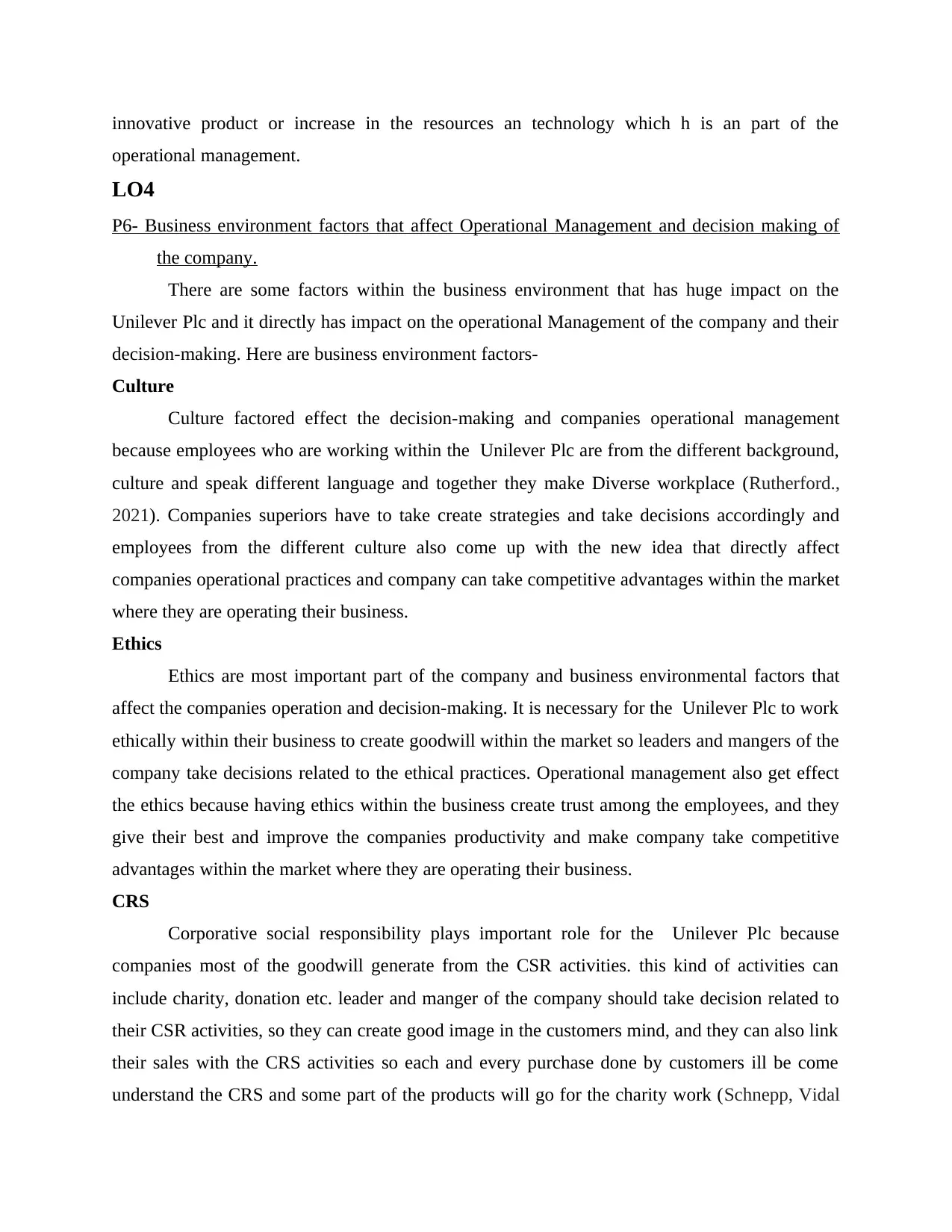
innovative product or increase in the resources an technology which h is an part of the
operational management.
LO4
P6- Business environment factors that affect Operational Management and decision making of
the company.
There are some factors within the business environment that has huge impact on the
Unilever Plc and it directly has impact on the operational Management of the company and their
decision-making. Here are business environment factors-
Culture
Culture factored effect the decision-making and companies operational management
because employees who are working within the Unilever Plc are from the different background,
culture and speak different language and together they make Diverse workplace (Rutherford.,
2021). Companies superiors have to take create strategies and take decisions accordingly and
employees from the different culture also come up with the new idea that directly affect
companies operational practices and company can take competitive advantages within the market
where they are operating their business.
Ethics
Ethics are most important part of the company and business environmental factors that
affect the companies operation and decision-making. It is necessary for the Unilever Plc to work
ethically within their business to create goodwill within the market so leaders and mangers of the
company take decisions related to the ethical practices. Operational management also get effect
the ethics because having ethics within the business create trust among the employees, and they
give their best and improve the companies productivity and make company take competitive
advantages within the market where they are operating their business.
CRS
Corporative social responsibility plays important role for the Unilever Plc because
companies most of the goodwill generate from the CSR activities. this kind of activities can
include charity, donation etc. leader and manger of the company should take decision related to
their CSR activities, so they can create good image in the customers mind, and they can also link
their sales with the CRS activities so each and every purchase done by customers ill be come
understand the CRS and some part of the products will go for the charity work (Schnepp, Vidal
operational management.
LO4
P6- Business environment factors that affect Operational Management and decision making of
the company.
There are some factors within the business environment that has huge impact on the
Unilever Plc and it directly has impact on the operational Management of the company and their
decision-making. Here are business environment factors-
Culture
Culture factored effect the decision-making and companies operational management
because employees who are working within the Unilever Plc are from the different background,
culture and speak different language and together they make Diverse workplace (Rutherford.,
2021). Companies superiors have to take create strategies and take decisions accordingly and
employees from the different culture also come up with the new idea that directly affect
companies operational practices and company can take competitive advantages within the market
where they are operating their business.
Ethics
Ethics are most important part of the company and business environmental factors that
affect the companies operation and decision-making. It is necessary for the Unilever Plc to work
ethically within their business to create goodwill within the market so leaders and mangers of the
company take decisions related to the ethical practices. Operational management also get effect
the ethics because having ethics within the business create trust among the employees, and they
give their best and improve the companies productivity and make company take competitive
advantages within the market where they are operating their business.
CRS
Corporative social responsibility plays important role for the Unilever Plc because
companies most of the goodwill generate from the CSR activities. this kind of activities can
include charity, donation etc. leader and manger of the company should take decision related to
their CSR activities, so they can create good image in the customers mind, and they can also link
their sales with the CRS activities so each and every purchase done by customers ill be come
understand the CRS and some part of the products will go for the charity work (Schnepp, Vidal
Paraphrase This Document
Need a fresh take? Get an instant paraphrase of this document with our AI Paraphraser
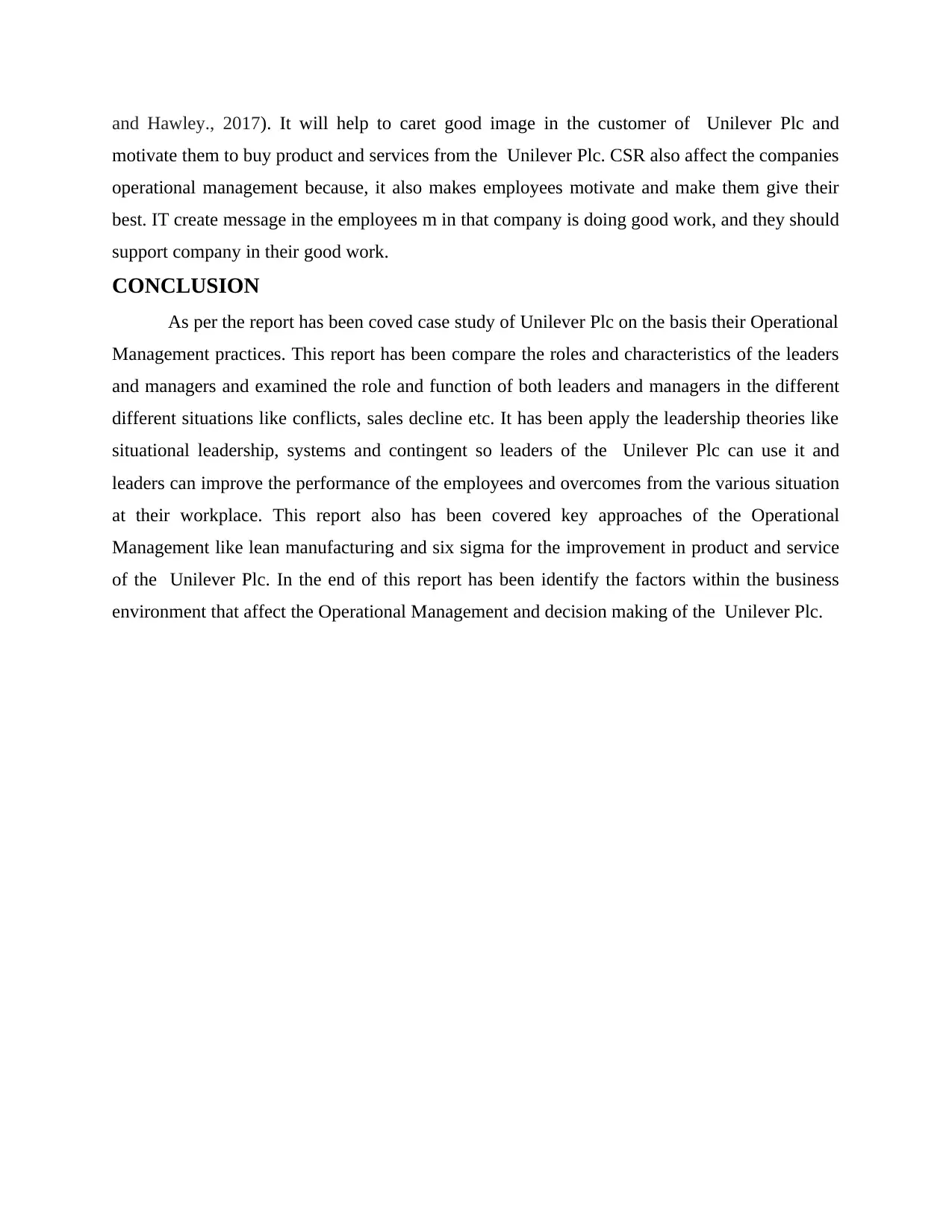
and Hawley., 2017). It will help to caret good image in the customer of Unilever Plc and
motivate them to buy product and services from the Unilever Plc. CSR also affect the companies
operational management because, it also makes employees motivate and make them give their
best. IT create message in the employees m in that company is doing good work, and they should
support company in their good work.
CONCLUSION
As per the report has been coved case study of Unilever Plc on the basis their Operational
Management practices. This report has been compare the roles and characteristics of the leaders
and managers and examined the role and function of both leaders and managers in the different
different situations like conflicts, sales decline etc. It has been apply the leadership theories like
situational leadership, systems and contingent so leaders of the Unilever Plc can use it and
leaders can improve the performance of the employees and overcomes from the various situation
at their workplace. This report also has been covered key approaches of the Operational
Management like lean manufacturing and six sigma for the improvement in product and service
of the Unilever Plc. In the end of this report has been identify the factors within the business
environment that affect the Operational Management and decision making of the Unilever Plc.
motivate them to buy product and services from the Unilever Plc. CSR also affect the companies
operational management because, it also makes employees motivate and make them give their
best. IT create message in the employees m in that company is doing good work, and they should
support company in their good work.
CONCLUSION
As per the report has been coved case study of Unilever Plc on the basis their Operational
Management practices. This report has been compare the roles and characteristics of the leaders
and managers and examined the role and function of both leaders and managers in the different
different situations like conflicts, sales decline etc. It has been apply the leadership theories like
situational leadership, systems and contingent so leaders of the Unilever Plc can use it and
leaders can improve the performance of the employees and overcomes from the various situation
at their workplace. This report also has been covered key approaches of the Operational
Management like lean manufacturing and six sigma for the improvement in product and service
of the Unilever Plc. In the end of this report has been identify the factors within the business
environment that affect the Operational Management and decision making of the Unilever Plc.
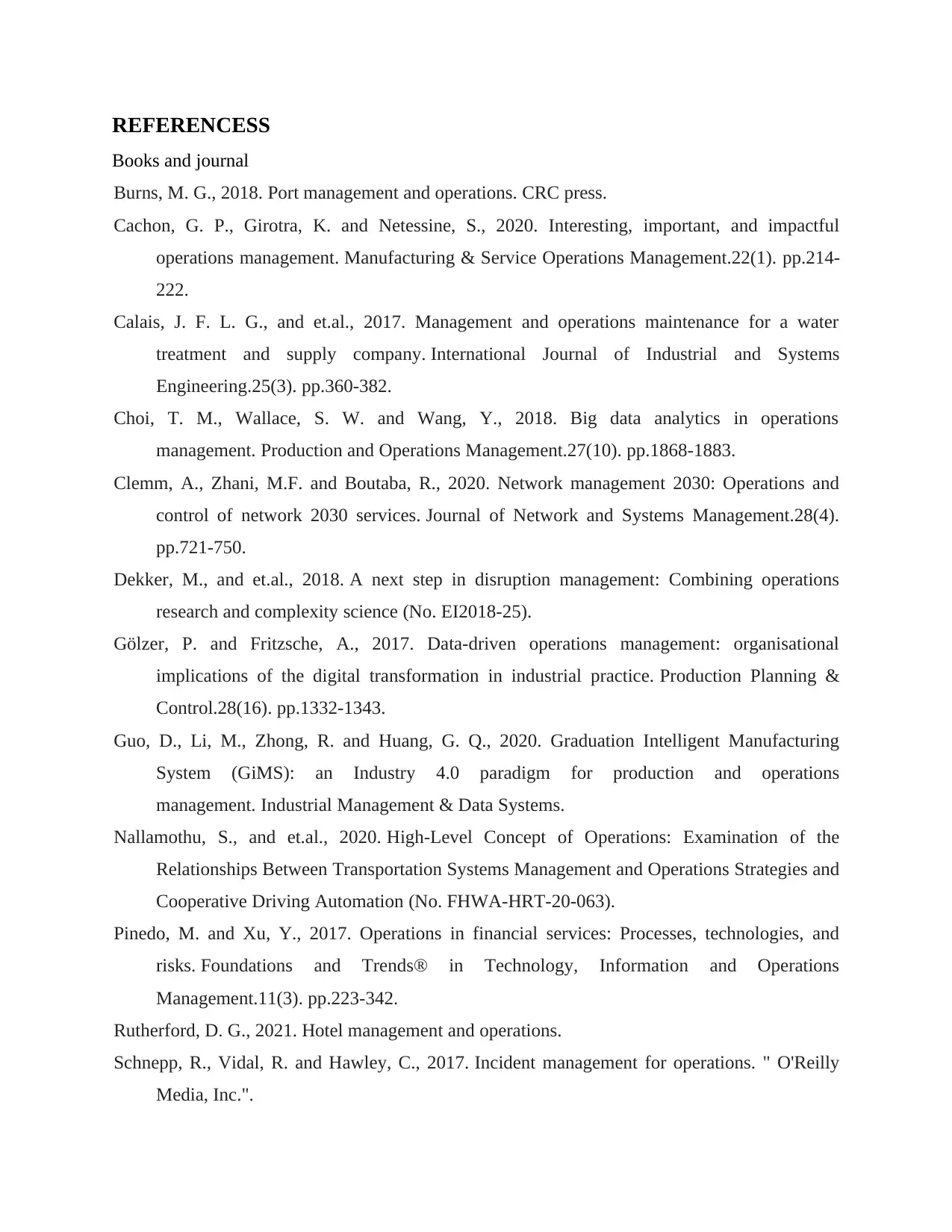
REFERENCESS
Books and journal
Burns, M. G., 2018. Port management and operations. CRC press.
Cachon, G. P., Girotra, K. and Netessine, S., 2020. Interesting, important, and impactful
operations management. Manufacturing & Service Operations Management.22(1). pp.214-
222.
Calais, J. F. L. G., and et.al., 2017. Management and operations maintenance for a water
treatment and supply company. International Journal of Industrial and Systems
Engineering.25(3). pp.360-382.
Choi, T. M., Wallace, S. W. and Wang, Y., 2018. Big data analytics in operations
management. Production and Operations Management.27(10). pp.1868-1883.
Clemm, A., Zhani, M.F. and Boutaba, R., 2020. Network management 2030: Operations and
control of network 2030 services. Journal of Network and Systems Management.28(4).
pp.721-750.
Dekker, M., and et.al., 2018. A next step in disruption management: Combining operations
research and complexity science (No. EI2018-25).
Gölzer, P. and Fritzsche, A., 2017. Data-driven operations management: organisational
implications of the digital transformation in industrial practice. Production Planning &
Control.28(16). pp.1332-1343.
Guo, D., Li, M., Zhong, R. and Huang, G. Q., 2020. Graduation Intelligent Manufacturing
System (GiMS): an Industry 4.0 paradigm for production and operations
management. Industrial Management & Data Systems.
Nallamothu, S., and et.al., 2020. High-Level Concept of Operations: Examination of the
Relationships Between Transportation Systems Management and Operations Strategies and
Cooperative Driving Automation (No. FHWA-HRT-20-063).
Pinedo, M. and Xu, Y., 2017. Operations in financial services: Processes, technologies, and
risks. Foundations and Trends® in Technology, Information and Operations
Management.11(3). pp.223-342.
Rutherford, D. G., 2021. Hotel management and operations.
Schnepp, R., Vidal, R. and Hawley, C., 2017. Incident management for operations. " O'Reilly
Media, Inc.".
Books and journal
Burns, M. G., 2018. Port management and operations. CRC press.
Cachon, G. P., Girotra, K. and Netessine, S., 2020. Interesting, important, and impactful
operations management. Manufacturing & Service Operations Management.22(1). pp.214-
222.
Calais, J. F. L. G., and et.al., 2017. Management and operations maintenance for a water
treatment and supply company. International Journal of Industrial and Systems
Engineering.25(3). pp.360-382.
Choi, T. M., Wallace, S. W. and Wang, Y., 2018. Big data analytics in operations
management. Production and Operations Management.27(10). pp.1868-1883.
Clemm, A., Zhani, M.F. and Boutaba, R., 2020. Network management 2030: Operations and
control of network 2030 services. Journal of Network and Systems Management.28(4).
pp.721-750.
Dekker, M., and et.al., 2018. A next step in disruption management: Combining operations
research and complexity science (No. EI2018-25).
Gölzer, P. and Fritzsche, A., 2017. Data-driven operations management: organisational
implications of the digital transformation in industrial practice. Production Planning &
Control.28(16). pp.1332-1343.
Guo, D., Li, M., Zhong, R. and Huang, G. Q., 2020. Graduation Intelligent Manufacturing
System (GiMS): an Industry 4.0 paradigm for production and operations
management. Industrial Management & Data Systems.
Nallamothu, S., and et.al., 2020. High-Level Concept of Operations: Examination of the
Relationships Between Transportation Systems Management and Operations Strategies and
Cooperative Driving Automation (No. FHWA-HRT-20-063).
Pinedo, M. and Xu, Y., 2017. Operations in financial services: Processes, technologies, and
risks. Foundations and Trends® in Technology, Information and Operations
Management.11(3). pp.223-342.
Rutherford, D. G., 2021. Hotel management and operations.
Schnepp, R., Vidal, R. and Hawley, C., 2017. Incident management for operations. " O'Reilly
Media, Inc.".
⊘ This is a preview!⊘
Do you want full access?
Subscribe today to unlock all pages.

Trusted by 1+ million students worldwide
1 out of 13
Related Documents
Your All-in-One AI-Powered Toolkit for Academic Success.
+13062052269
info@desklib.com
Available 24*7 on WhatsApp / Email
![[object Object]](/_next/static/media/star-bottom.7253800d.svg)
Unlock your academic potential
Copyright © 2020–2026 A2Z Services. All Rights Reserved. Developed and managed by ZUCOL.





